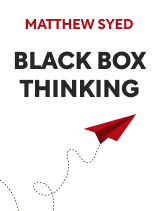

This article is an excerpt from the Shortform book guide to "Black Box Thinking" by Matthew Syed. Shortform has the world's best summaries and analyses of books you should be reading.
Like this article? Sign up for a free trial here .
Why is learning from failure beneficial? How can you develop by learning from failure?
Black Box Thinking shows how learning from failure can benefit you personally and society as a whole. Without making mistakes and learning from failure, the world would be a very different place.
Read on to explore why human development requires learning from failure.
We Learn Through Failure
Syed argues that we can only improve by learning from our failures. This is because your mistakes reveal what you don’t yet understand, thus showing what you need to learn next. For example, revising an essay always reveals vagueness or unclear logic in the first draft, and those mistakes tell the writer how to improve the essay.
On the flip side, neglecting to learn from mistakes means that you can’t improve. Imagine a gymnast who gets flustered by mistakes instead of assessing how to avoid them—such an athlete would keep repeating the same errors.
On the institutional level, organizations that learn from failures iron out systemic flaws and improve their performance. For example, lean startups prioritize learning from what goes wrong, adapting from customer feedback and product failures. By contrast, organizations that ignore their mistakes will continue to make them, risking stagnation.
(Shortform note: In The Art of Learning, Josh Waitzkin argues that learning from your mistakes is the key to competitive success. When you make an error, note where you went wrong and shore up that weakness by training yourself not to repeat it. He also recommends actively seeking out opportunities to fail badly and repeatedly, because this humbles you and helps you approach learning with a beginner’s mind. In a way, this is what learning organizations do: They embrace that what they do know is less than what they don’t know.)
Failure and Human Development
Black Box Thinking is about learning from failure. Syed argues that learning from failure drives the growth of large organizations, underpins innovation in business, and helps us become resilient, growth-oriented agents. Airlines exemplify this mindset and method, using “black boxes” to collect data, analyze crashes, and learn from them.
However, we still fail to learn from our mistakes in multiple key areas—from health care to criminal justice—and this endangers lives and resources.
Matthew Syed is an award-winning journalist, author, and former Olympian for Great Britain’s table tennis team. He’s worked as a journalist for over two decades, and he’s written four books focused on mindset, performance, and growth. Syed also works as a consultant to help organizations build growth-focused cultures and foster continual improvement.
In this guide, we’ll explain Black Box Thinking in four parts. Part 1 introduces Syed’s argument that success comes from failure and explains the history of humanity’s attitudes toward failure. Part 2 explores the institutions that learn from failure—how, why, and the benefits they reap—while Part 3 discusses institutions that neglect to learn from failure and the problems this causes. To end, Part 4 explains how to embrace failure as positive, and how to develop a learning organization.
We’ve clarified and expanded Syed’s ideas with perspectives from The Fifth Discipline: The Art and Practice of the Learning Organization, by Peter Senge, and from Tribal Leadership, by Dave Logan et al.—both of which treat organizational development in detail.
We Develop Through Failure
The core of Syed’s argument is that, as individuals, we can only improve by learning from our failures. On the flip side, neglecting to learn from mistakes means that you can’t improve. For example, a dancer who takes every mistake as a chance to grow will get better, while a dancer who ignores or denies her errors will remain static.
This also applies on the institutional level: Organizations that learn from failures iron out systemic flaws and improve their performance. Organizations that ignore their mistakes will continue to make them, risking stagnation.
(Shortform note: In The Art of Learning, Josh Waitzkin argues that learning from your mistakes is the key to competitive success. When you make an error, note where you went wrong and shore up that weakness by training yourself not to repeat it. He also recommends actively seeking out opportunities to fail badly and repeatedly, because this humbles you and helps you approach learning with a beginner’s mind. In a way, this is what learning organizations do: They embrace that what they do know is less than what they don’t know.)
From here, Syed argues that we need to spread failure-based learning throughout modern society. Neglecting to learn wastes lives and resources, such as the tens of thousands of annual deaths from preventable errors in hospitals and the thousands of wrongful convictions in the court system. (Shortform note: To clarify, Syed bases his argument around the American health care and court systems, though he also cites some examples from the UK’s hospitals.)
Progress—our ability to develop our knowledge, our societies, or our technology—is a hallmark of human civilization. We develop by learning from failure, but so long as such major institutions neglect this opportunity, we won’t progress as smoothly.
(Shortform note: Steven Pinker, a Canadian-American psycholinguist, argues in Enlightenment Now that reason is the primary driver of humanity’s progress. He asserts that reason, science, and humanism have yielded longer life spans, better food production, greater wealth, more peace, democracy, individual rights, and more. While Syed doesn’t explicitly define “progress,” Pinker suggests that we should aim to continuously improve human flourishing, in “life, health, happiness… richness of experience.”)

———End of Preview———
Like what you just read? Read the rest of the world's best book summary and analysis of Matthew Syed's "Black Box Thinking" at Shortform .
Here's what you'll find in our full Black Box Thinking summary :
- How an organization’s culture and systems either promote or prevent learning
- The steps for learning from failure in our complex world
- How to shift mindsets around failure to promote a learning-oriented institution






